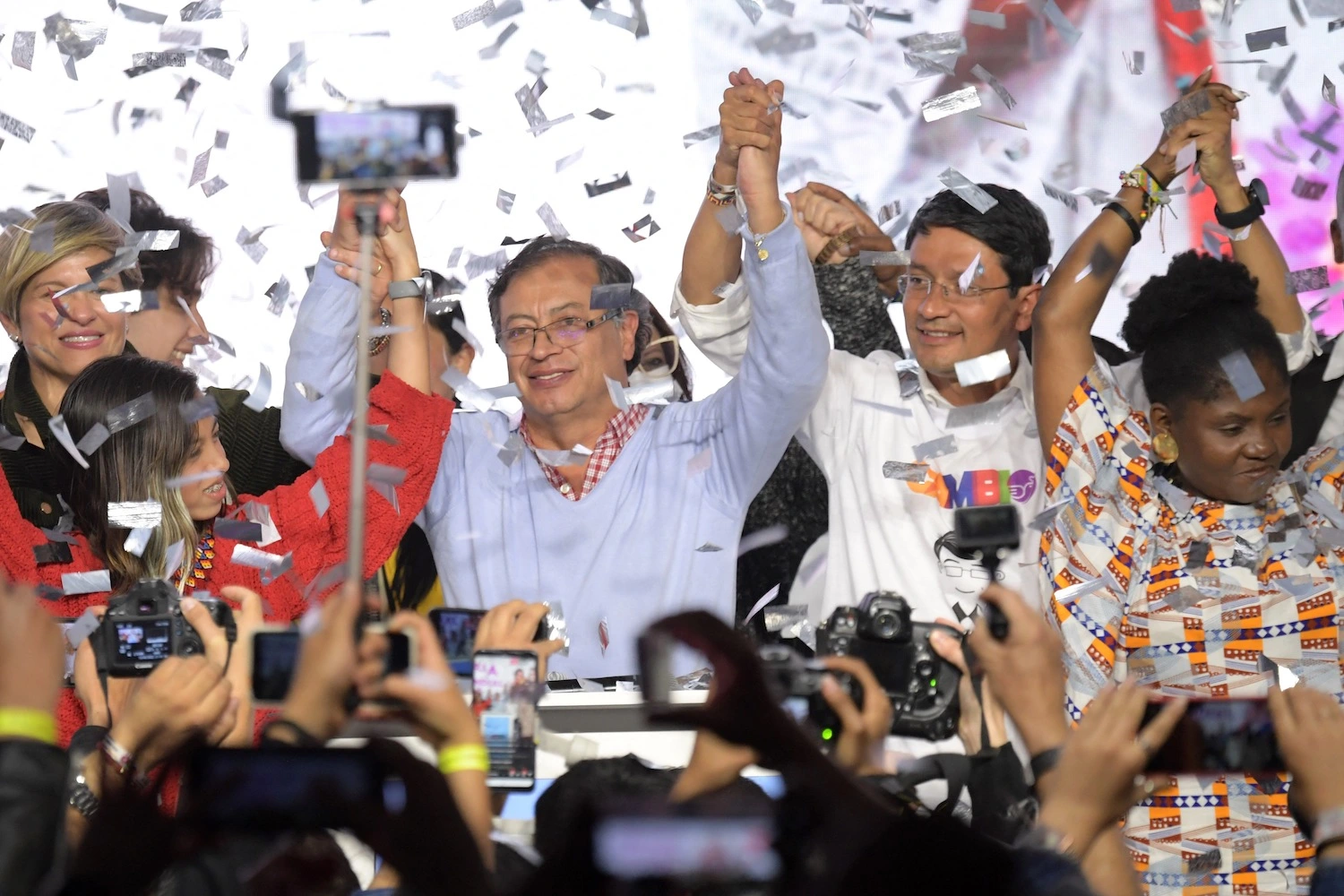
Gustavo Petro, the presidential candidate, celebrates after winning the primary for the leftist Pacto Historico coalition in Bogotá on March 13. Photo: Raul Arboleda / AFP via Getty Images.

Orinoco Tribune – News and opinion pieces about Venezuela and beyond
From Venezuela and made by Venezuelan Chavistas

Gustavo Petro, the presidential candidate, celebrates after winning the primary for the leftist Pacto Historico coalition in Bogotá on March 13. Photo: Raul Arboleda / AFP via Getty Images.
Caracas, March 23, 2022 (OrinocoTribune.com)—In this new episode of Chavista Chronicles from Caracas we had the pleasure of interviewing Colombian journalist based in Cali, David Escobar.
The young Colombian journalist, who covered in detail Colombia’s National Strike in 2021, told us that 168 social leaders were killed in 2021 and so far this year there have been 61 deaths. He updated us about the terrible conditions for exercising journalism in Colombia, which at one point forced him leave his house and his hometown Cali, due to death threats he was receiving, in a violation of the most basic human rights.
David Escobar graduated in journalism and communication from the Universidad del Valle in Cali, and has worked in recent years as a documentarian, producing and directing several documentaries like Colombia: Young Protestors Dead and Disappeared, Paren de Matarnos, and as researcher for Bajo Fuego, among the most recent ones.
RELATED CONTENT: Colombia: Registrar Will Not Ask Electoral Council for Senate Vote Recount
Saheli Chowdhury and Jesús Rodriguez-Espinoza from the Orinoco Tribune editorial team conducted the interview around four main issues:
1- Current security environment in Colombia for progressive leaders and activists
2- March 13 Elections for Congress: results, balance of power
3- May presidential elections scenarios
4- Colombian left and possible victory in the Latin American scenario
With respect to the analysis of the new correlation of forces, David Escobar stressed that the victory of the Historic Pact for Colombia [Pacto Histórico], representing the left, is an unprecedented victory that gives the left something of about 20-25% in both the Deputies Chamber and the Senate, if the election irregularities raised by the Historic Pact are properly processed by Colombian authorities. In this scenario Escobar said that he believes “Petro is trying to make this coalition the same way that Boric did in Chile,” meaning that he will have to lower his radical speech to bring in votes from the center or liberals.
In terms of possible outcomes in the Presidential first round, the Colombian journalist expressed with confidence that the Historic Pact is going to bring in the bases from the Liberal Party and the Green Party. He also mentioned that Petro is in conversation with former Colombian president César Gaviria, Liberal Party leader, trying to build bridges and reach agreements.
David sees it as very necessary that Petro wins in the first round of the presidential election. For him Federico Gutiérrez, the candidate of Álvaro Uribe, is not gaining traction among voters even with adherents from other right-wing minority parties. But he raised attention about the paramilitary capacity to paralyze the intention to vote of many Colombians in remote areas controlled by these very powerful groups.
We asked David about the security around Gustavo Petro due to the long Colombian tradition of assassinating leftist presidential candidates. In his point of view, the strong security device organized to protect Petro is very robust although it could also be infiltrated. On this issue he very clearly stated that in his opinion an undesirable assassination of Petro would ignite a real civil war in the country, taking into consideration how tired Colombians are with their political class.
In a possible scenario of Gustavo Petro winning the presidential race next May 29, Escobar believes that it will represent a positive opportunity to consolidate leftist forces in Latin America, taking into consideration the expected victory of Lula de Silva in Brazil. Petro, as well as Boric in Chile, see Lula as a role model and also many in Venezuela admire and respect Lula, so a chance of building bridges between the different lefts that are already in power in the region could very well become a reality.
On the other hand, he let us know that if the opposite outcome materializes in Colombia and Federico Gutiérrez becomes the new President, the opportunity for Latin American unity as well as relations with Venezuela is going to be worse than what we have seen with Iván Duque.
Featured image: Gustavo Petro, the presidential candidate, celebrates after winning the primary for the leftist Pacto Histórico coalition in Bogotá on March 13. Photo: Raul Arboleda / AFP via Getty Images.
Special for Orinoco Tribune by staff
OT/JRE/DD